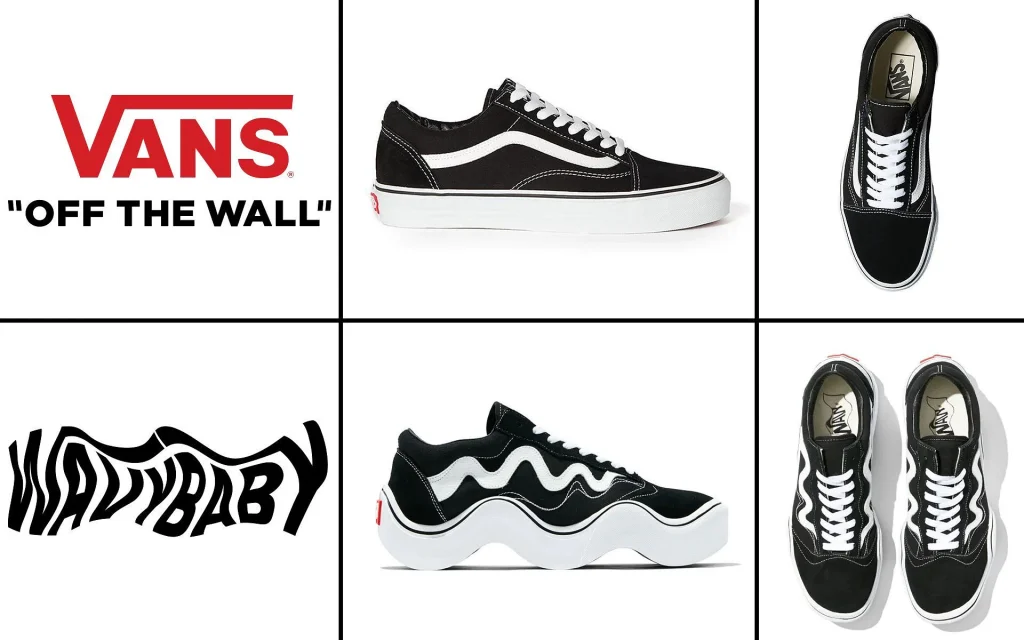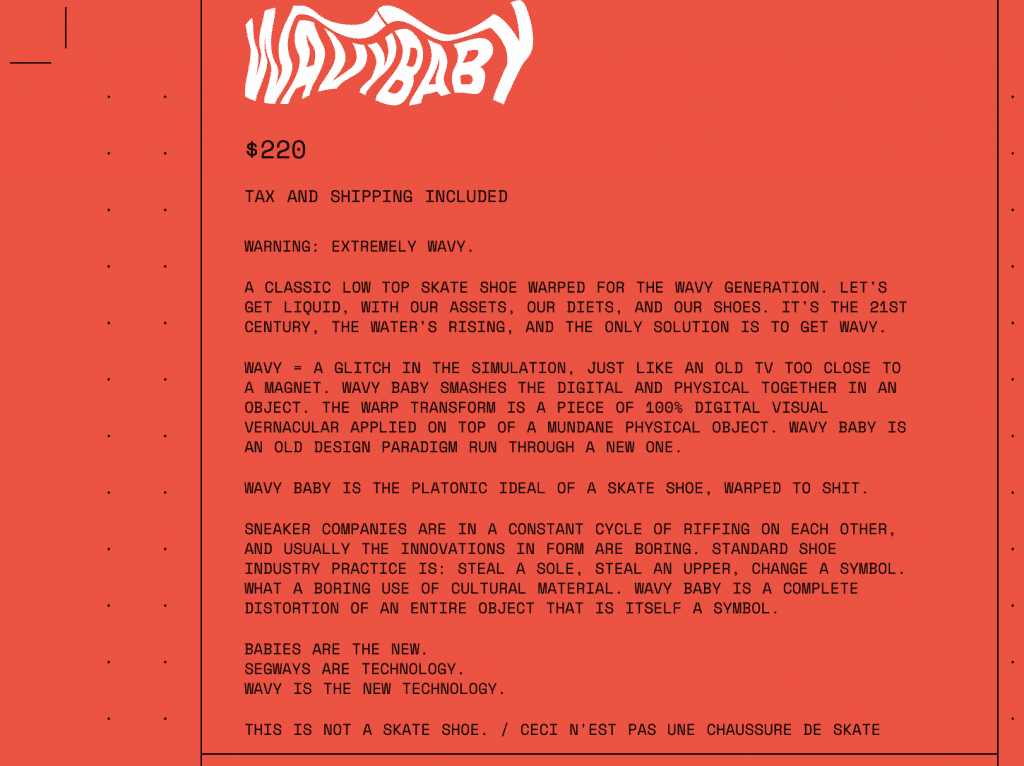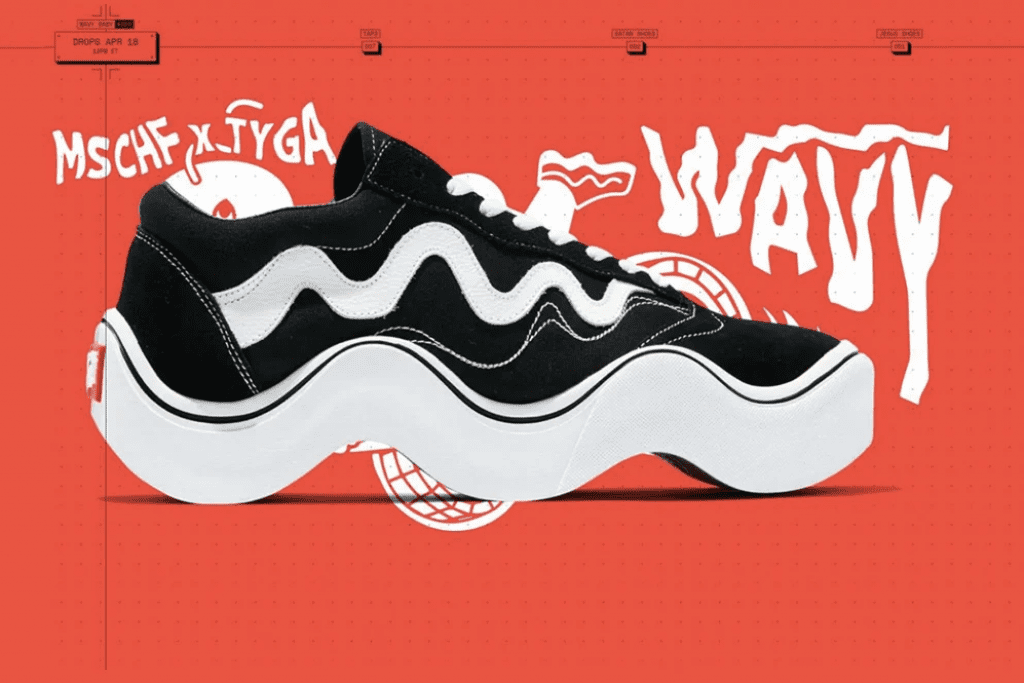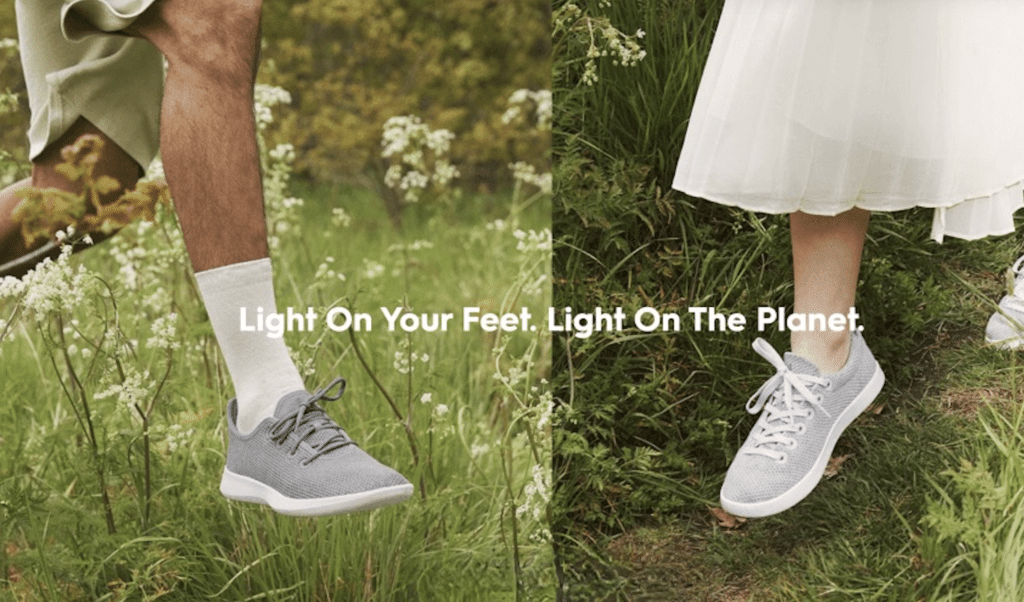A New York federal court has ordered MSCHF to refrain from offering up, marketing, and/or fulfilling existing orders for its allegedly infringing Wavy Baby sneakers for the duration of the trademark-centric case that Vans filed against it last month. In a decision and order dated April 29, Judge William Kuntz of the U.S. District Court for the Eastern District of New York sided with Vans, granting its motion for a temporary restraining order and preliminary injunction on the basis that Vans is likely to prevail on the merits of its underlying claims, including trademark infringement, and that the sneaker-maker is likely to suffer irreparable harm unless MSCHF’s alleged infringement is stopped.
First addressing the likelihood that consumers will be confused as to the nature of MSCHF’s Wavy Baby sneakers, the court pointed to the “striking visual similarities between the [Vans] Old Skool shoes and the Wavy Baby shoes and their respective packaging.” The court was not persuaded by MSCHF’s argument that while it makes use of marks that are similar to Vans’ marks, it has “distorted” those marks, thereby, making them different from the ones that Vans uses to indicate the source of its offerings. The marks “need not be identical, but rather only similar, for there to be a likelihood of confusion,” per Judge Kuntz, who stated that the critical question is not whether the differences between the two shoes/marks “are easily discernable on simultaneous viewing, but whether they are likely to be memorable enough to dispel confusion on serial viewing.”
MSCHF’s distortion of the original Vans trademarks is insufficient to dispel consumer confusion, according to the court, which also noted that Vans sufficiently establishes that there is actual confusion at play, namely, by way of comments from consumers about the similarity of the two parties’ shoes, and more importantly, comments that demonstrate that “consumers have misunderstood the source of the Wavy Baby sneakers as a collaboration between” MSCHf and Vans.
As for consumer sophistication (a factor in the likelihood of confusion analysis), the court sided with Vans here, unpersuaded by MSCHF’s claims that “few of the purchasers of the Wavy Baby shoes were likely to be unsophisticated members of the general public” by virtue of the fact that the shoes were only available for a short time on MSCHF’s app. The court stated that the MSCHf sneakers were offered up to the general public “through self-service mediums accessible without professional assistance,” and noted that “shoes generally are a common consumer item.” Also weighing in Vans’ favor, according to the court, is the fact that MSCHF engaged in a “broad advertising campaign” for the Wavy Baby shoes in collaboration with Tyga, which makes it “likely that at least some buyers of the Wavy Baby shoes purchased them as a result.”
(To be fair, while the court states that the MSCHF sneakers were offered up and advertised to the general public, and that sneakers, generally, are a common consumer product, which suggests that the level of consumer sophistication and attention to detail in connection with such a purchase is low, there is actually a very good chance that most of the individuals who are in the market to buy MSCHF sneakers are distinct from the average sneaker buyer, which stands to impact the level of consumer sophistication at play here, and thus, the likelihood of confusion.)

In terms of the proximity of the two parties’ offerings (another likelihood of confusion factor), the court determined that Vans demonstrated “sufficient proximity,” specifically pointing to its practice of regularly releasing special edition versions of the Old Skool shoes, including in limited quantities, in collaboration with others, and at similar price points as the MSCHF sneakers. And in pushing back against MSCHF’s argument that its sneakers are more akin to artworks “likely to be kept in glass cases or on shelves” than to Vans’ more wearable Old Skool shoes, the court cited a podcast interview with MSCHF chief creative officer Lukas Bentel, who stated that the Wavy Baby sneakers, as distinct from previous MSCHF sneaker releases, are a move by MSCHF to “transcend into more of a straight sneaker space.”
Turning his attention to MSCHF’s First Amendment arguments, namely, that Vans is unlikely to succeed on the merits of its trademark claims because the Wavy Baby sneakers are a “parodic or artistic expression” of Vans’ marks, Judge Kuntz asserted that the MSCHF sneakers “do not meet the requirements for a successful parody.” While the Wavy Baby sneakers “convey their similarly and reference to the Old Skool shoe trademarks,” they do not “sufficiently articulate ‘an element of satire, ridicule, joking or amusement’ clearly indicating to the ordinary observer that [MSCHF] is ‘not connected in any way with [Vans],” according to the court.
MSCHF included its own branding on the shoe label and “distorted” the original Vans trademarks, but “the extensive similarities and overall impression [of the MSCHF sneaker] overcome any such distinguishing features,” Judge Kuntz stated, “as evidenced by actual confusion in the marketplace.” Moreover, the judge stated that while the manifesto accompanying the shoes – which commented on the rampant copying in the sneaker space, Vans’ “outsized role” in consumer culture, and Vans’ ventures in the metaverse – “may contain protected parodic expression,” the shoes, themselves, and the packaging “fail to convey the satirical message.”

Addressing MSCHF’s reference to the Louis Vuitton v. My Other Bag case, in which MOB successfully argued parody in connection with its manufacture and sale of canvas tote bags bearing depictions of Louis Vuitton-like bags, Judge Kuntz says the case at hand is distinguishable, as “the satirical message presented by the Wavy Baby shoes is not readily perceived from the product without the accompanying manifesto or descriptions.” As such, this is different from the play on the well-known “my other car …” joke in the My Other Bag case, Judge Kuntz asserts.
Judge Kuntz also shoots down MSCHF’s comparison of the Wavy Baby sneakers to the rubber dog toys in the Bad Spaniels case. Unlike the MSCHF and Vans sneakers, the dog toy in the Bad Spaniels case “does not occupy the same market as Jack Daniels whiskey,” per Judge Kuntz, who notes that “where the infringement claim involves a competing product, ‘parodic use is sharply limited.’” Beyond that, the dog toy incorporates “clear puns and parodic references and displays clear distinctions between the products, making the parody more discernable and overt,” according to the judge.
Finally, Judge Kuntz determined that the irreparable harm factor weighs in favor of Vans, as the Wavy Baby shoes “create a strong risk of consumer confusion and irreparable harm to the consumer recognition and good will cultivated by [Vans,’” namely, the brand recognition and success of the Old Skool shoes and associated trade dress that Vans has spent forty-five years and millions of dollars in marketing. The court also stated that MSCHF “failed to many any representations” that it would “not continue to produce iterations of the Wavy Baby shoes following the conclusion of the present litigation for one reason: it intends to do precisely that.”
Against this background, the court granted Vans’ request for a temporary restraining order and preliminary injunction, thereby, requiring MSCHF and all persons acting in concert with it to refrain from “advertising, marketing, prompting, offering to sell, selling, distributing, and/or taking orders” – or fulfilling existing orders – for the Wavy Baby shoes. MSCHF must also “reverse and/or cancel any orders for the shoes that have been places as of the time” of the court’s order, and put the revenues from all of orders for the Wavy Baby sneakers that it did fulfill (roughly 4,000 pairs) into escrow.
It is not yet clear whether MSCHF will appeal, and as of now, all mention/images of the Wavy Baby sneakers have been removed from MSCHF’s website. Imagery of the Wavy Baby sneakers remains on the social media accounts of MSCHF collaborator Tyga, who is not named as a defendant in Vans’ suit.
UPDATED (May 2, 2022): Counsel for MSCHF has filed a notice of appeal to the U.S. Court of Appeals for the Second Circuit in response to the district court’s grant of a temporary restraining order and preliminary injunction.
The case is Vans, Inc. v. MSCHF Product Studio, Inc., 1:22-cv-02156 (EDNY).











